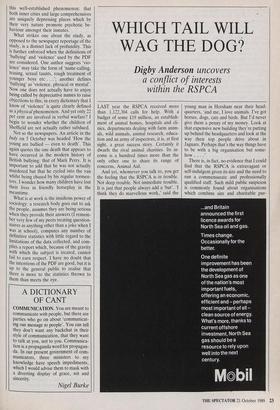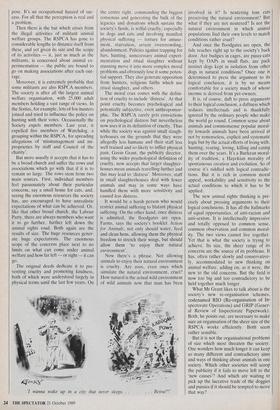WHICH TAIL WILL WAG THE DOG?
Digby Anderson uncovers
a conflict of interests
within the RSPCA LAST year the RSPCA received more than 1,122,304 calls for help. With a budget of some £19 million, an establish- ment of animal homes, hospitals and cli- nics, departments dealing with farm anim- als, wild animals, animal research, educa- tion and an army of inspectors, it is, at first sight, a great success story. Certainly it dwarfs the rival animal charities. Its in- come is a hundred times more than the only other one to share its range of concerns, Animal Aid.
And yet, whomever you talk to, you get the feeling that the RSPCA is in trouble. Not deep trouble. Not immediate trouble. It is just that people always add a 'but'. 'I think they do marvellous work,' said the young man in Horsham near their head- quarters, 'and me, I love animals. I've got horses, dogs, cats and birds. But I'd never give them a penny of my money. Look at that expensive new building they're putting up behind the headquarters and look at the way their top people drive about in Jaguars. Perhaps that's the way things have to be with a big organisation but some- how . . .
There is, in fact, no evidence that I could find that the RSPCA is extravagant or self-indulgent given its size and the need to run a commensurate and professionally qualified staff. Such mild public suspicion is commonly found about organisations which combine size and charitable pur- pose. It's an occupational hazard of suc- cess. For all that the perception is real and a problem.
Then there is the but which arises from the illegal activities of militant animal welfare groups. The RSPCA has gone to considerable lengths to distance itself from these, and yet given its size and the scope of its activities — it, just as much as the militants, is concerned about animal ex- perimentation — the public are bound to go on making associations after each out- rage.
Moreover, it is extremely probable that some militants are also RSPCA members. The society is after all the largest animal welfare organisation, with 25,000 adult members holding a vast range of views. In the Sixties, for example, lots of fox-hunters joined and tried to influence the policy on hunting with their votes. Occasionally the Society expels members. Last year, it expelled five members of Watchdog, a grouping within the RSPCA, for spreading allegations of 'mismanagement and im- proprieties by staff and Council of the charity'.
But more usually it accepts that it has to be a broad church and suffer the rows and associations which go with that if it is to remain so large. The rows stem from two main sources. First, individual members feel passionately about their particular concerns, say a small home for cats, and, seeing the enormous resources the society has, are encouraged to have unrealistic expectations of what can be achieved. Or, like that other broad church, the Labour Party, there are always members who want it to go further, further left down the animal rights road. Both again are the results of size. The huge resources gener- ate huge expectations. The enormous scope of the concerns place next to no limits on what can come under animal welfare and how far left — or right — it can go.
The original deeds dedicate it to pre- venting cruelty and promoting kindness, both of which were understood largely in physical terms until the last few years. On the centre right, commanding the biggest consensus and generating the bulk of the legacies and donations which sustain the society's funds, is wilful cruelty, especially to dogs and cats and involving manifest physical suffering — torture for amuse- ment, starvation, severe overcrowding, abandonment. Policies against trapping for furs, hunting, unnecessary animal experi- mentation and ritual slaughter without stunning move it into more complex moral problems and obviously lose it some poten- tial support. They also generate opposition from hunters, religious faiths which use ritual slaughter, and others.
The moral crux comes with the defini- tion of cruelty to include 'distress'. At that point cruelty becomes psychological and potentially subjective, even anthropomor- phic. The RSPCA rarely gets convictions on psychological distress but nevertheless now uses it in, its definition of cruelty. Thus while the society was against small slaugh- terhouses on the grounds that they were allegedly less humane and their staff less well trained and so likely to inflict physical pain, Gavin Grant, the publicity director, using the wider psychological definition of cruelty, now accepts that larger slaughter- houses mean animals travelling further and this may lead to 'distress'. Moreover, staff in small slaughterhouses deal with fewer animals and may in some ways have handled them with more sensitivity and caused less distress.
It would be a harsh-person who would restrict animal suffering to blatant physical suffering. On the other hand, once distress is admitted, the floodgates are open. Farms, says the society's booklet Action for Animals, not only should water, feed and clean hens, allowing them the physical freedom to stretch their wings, but should allow them 'to enjoy their natural environment'.
Now there's a phrase. Not allowing animals to enjoy their natural environment is cruelty. Are zoos, even ones which simulate the natural environment, cruel? How natural is the actual wild environment of wild animals now that man has been `I wanna wake up in a city that never sleeps.. . . . . Beirut?!' involved in it? Is neutering tom cats preserving the natural environment? But what if they are not neutered? Is not the natural environment in which animal populations find their own levels to match conditions rather cruel?
And once the floodgates are open, the tide reaches right up to the society's back door. Are budgies in cages, are pussy-cats kept by OAPs in small flats, are pack instinct dogs kept in isolation from other dogs in natural conditions? Once one is determined to press the argument to its logical conclusion, it is by no means comfortable for a society much of whose income is derived from pet-owners.
It is, of course, daft to press arguments to their logical conclusion, a daftness which seduces intellectuals and is thankfully ignored by the ordinary people who make the world go round. Common sense about animals and commonsense popular moral- ity towards animals have been arrived at not by remorseless, explicit and systematic logic but by the actual efforts of living with, hunting, rearing, loving, killing and eating them over the years. It's a Burkean moral- ity of tradition, a Hayekian morality of spontaneous creation and evolution. So of course it's riddled with logical contradic- tions. But it is rich in common moral appeal, workability and sensitivity to the actual conditions to which it has to be applied.
The new animal rights thinking is pre- cisely about pressing arguments to their logical conclusions. It has all the hallmarks of equal opportunities, of anti-racism and anti-sexism. It is intellectually impressive and totally opposed to common sense, common observation and common moral- ity. The two views cannot live together. Yet that is what the society is trying to achieve. Its size, the sheer range of its concerns are the source of its problems. It has, often rather slowly and conservative- ly, accommodated to new thinking on animal welfare, adding on, as it were, the new to the old concerns. But the field is now too big and too contradictory to be held together much longer.
What Mr Grant likes to talk about is the society's new re-organisation schemes, codenamed RIO (Re-organisation of In- spectorate Operations) and GRIP (Gener- al Review of Inspectorate Paperwork). Both, he points out, are necessary to make sure an organisation of the sheer size of the RSPCA works efficiently. Both seem rather sensible.
But it is not the organisational problems of size which most threaten the society. One wonders how much longer it can keep so many different and contradictory aims and ways of thinking about animals in one society. Which other societies will scoop the publicity if it fails to move left to the `new causes'? And which are waiting to pick up the lucrative trade of the doggies and pussies if it should be tempted to move that way?



























































 Previous page
Previous page